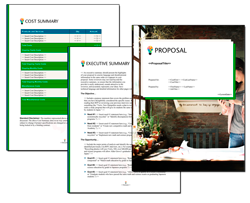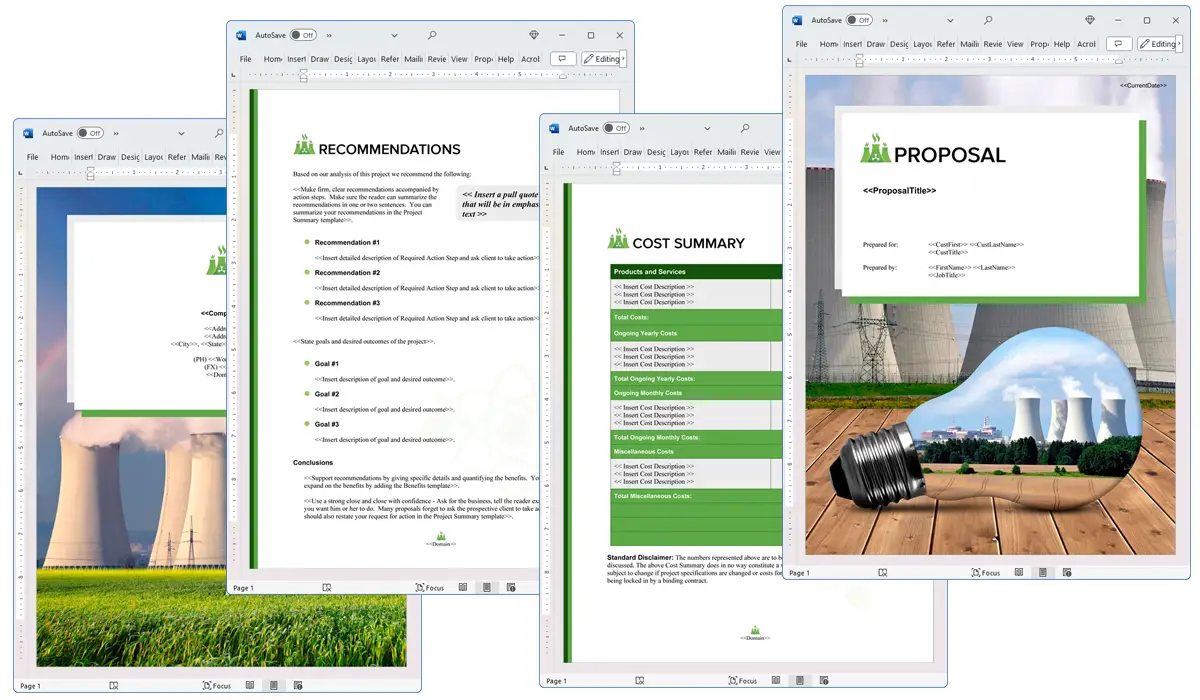What is the Demolition chapter used for?
Proposal Kit Professional Bundle adds more design themes, all six Contract Packs,
a project management library, and Expert Edition software.

Illustration of Proposal Pack Elegant #4
We include this Demolition chapter template in every Proposal Pack, along with thousands more. You assemble this chapter with others in various combinations to create custom-tailored business proposals, plans, reports, and other documents. Proposal Packs apply custom visual designs to the templates, giving the final documents a consistent professional finish.
 DOWNLOADABLE, ONE-TIME COST, NO SUBSCRIPTION FEES
DOWNLOADABLE, ONE-TIME COST, NO SUBSCRIPTION FEES
Overview of the Demolition Chapter
The Demolition Chapter is an important part of many proposal documents, particularly those involving construction and contracting projects. This chapter is tailored to outline the specific details and plans for demolishing an existing structure. Whether the project is about removing an outdated building to make way for new construction or taking down unsafe structures following a disaster, the Demolition Chapter helps to clearly communicate the objectives and methods of the demolition process to potential clients or partners.
How is the Demolition Chapter Used?
In a business proposal, the Demolition Chapter is used to provide a clear and comprehensive explanation of the demolition process. It serves to inform the reader about why the demolition is necessary and how it will be carried out. This chapter helps to establish credibility and assure the client that the demolition will be handled responsibly and safely. It sets the stage for the rest of the proposal by detailing the initial, and often critical, phase of the project.
What is Included in the Demolition Chapter?
The Demolition Chapter typically includes several key elements:
- Introduction: A brief overview of the project and the reasons behind the need for demolition.
- Objectives: Clear statements outlining the goals of the demolition process.
- Methodology: A detailed description of the techniques and equipment that will be used for the demolition.
- Safety Measures: Information on how safety will be ensured for workers and the surrounding community during the demolition.
- Timeline: An estimated schedule for the demolition activities.
- Environmental Considerations: Details on how environmental impacts will be mitigated during the demolition process.
Use Case Examples for the Demolition Chapter
- Construction Proposals: When a new building or infrastructure is planned, and an existing structure needs to be removed.
- Urban Development Projects: In proposals related to city or neighborhood rejuvenation where old buildings are demolished to make space for new developments.
- Disaster Recovery Initiatives: Proposals for clearing rubble and destroyed structures post-natural disaster to facilitate reconstruction and rehabilitation.
- Environmental Cleanup Projects: When a structure is demolished as part of efforts to remove environmentally hazardous materials from a site.
- Historical Preservation Efforts: Sometimes, parts of historical structures are carefully demolished to be reconstructed or restored elsewhere.
Key Takeaways
- The Demolition Chapter is important for proposals involving the removal of existing structures.
- It provides a detailed plan that includes the methodology, objectives, and safety measures of the demolition.
- This chapter ensures that the proposal communicates the necessity and logistics of demolition clearly to the client.
- It is used in a variety of contexts from construction and urban development to disaster recovery and environmental cleanups.
- Proper use of the Demolition Chapter enhances the credibility of the proposal and helps in winning clients' trust and approval.

Illustration of Proposal Pack Social Media #2
 What Our Clients Say
What Our Clients SayI purchased the Proposal Kit because of the sample training proposal provided. I have only heard good things about Proposal Kit."
Founder & CEO
MySystemGo & MySavvySeniors
 4.7 stars, based on 849 reviews
4.7 stars, based on 849 reviewsRelated Chapters
Document Layouts Using the Demolition Chapter

The Demolition chapter and other chapters are integrated into a Word document as illustrated here in the Proposal Pack Energy #11 design theme. There are hundreds of design themes available, and every design theme includes the Demolition chapter template.
A proper business proposal will include multiple chapters. This chapter is just one of many you can build into your proposal. We include the complete fill-in-the-blank template in our Proposal Pack template collections. We also include a library of sample proposals illustrating how companies in different industries, both large and small, have written proposals using our Proposal Packs. This template will show you how to write the Demolition.
We include a chapter library for you to build from based on your needs. All proposals are different and have different needs and goals. Pick the chapters from our collection and organize them as needed for your proposal.
Using the Proposal Pack template library, you can create any business proposal, report, study, plan, or document.
The Wizard software includes an AI Writer, which will write the content of this and any other chapter of your document. Use the AI Writer to do the heavy lifting, writing the first draft of your proposal or business document in minutes.
 Ian Lauder has been helping businesses write their proposals and contracts for two decades. Ian is the owner and founder of Proposal Kit, one of the original sources of business proposal and contract software products started in 1997.
Ian Lauder has been helping businesses write their proposals and contracts for two decades. Ian is the owner and founder of Proposal Kit, one of the original sources of business proposal and contract software products started in 1997.By Ian Lauder
 Published by Proposal Kit, Inc.
Published by Proposal Kit, Inc.


 Cart
Cart
 Facebook
Facebook YouTube
YouTube Bluesky
Bluesky Search Site
Search Site